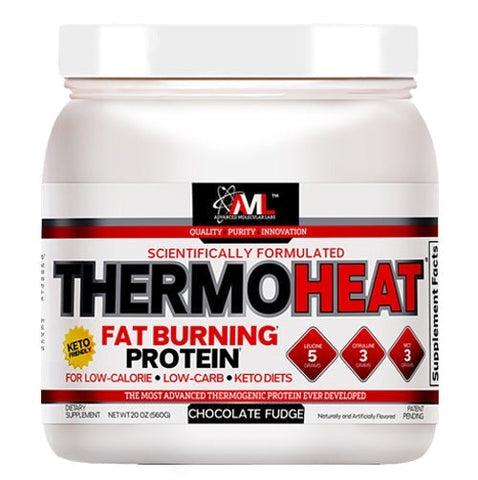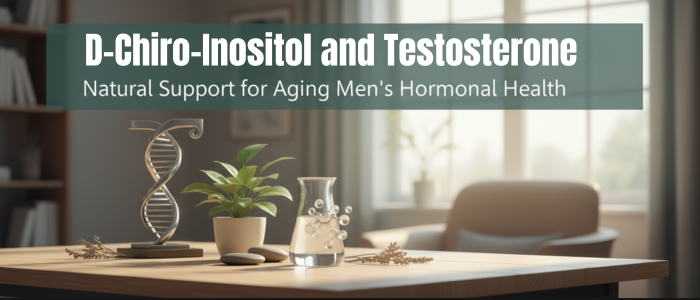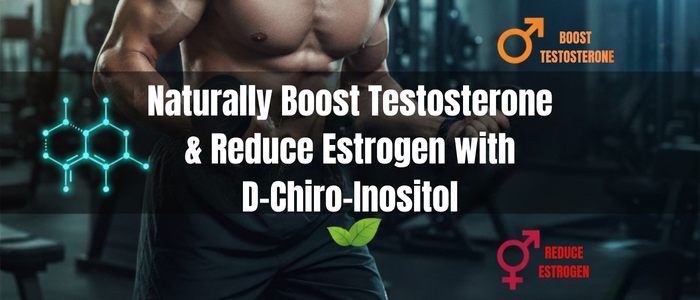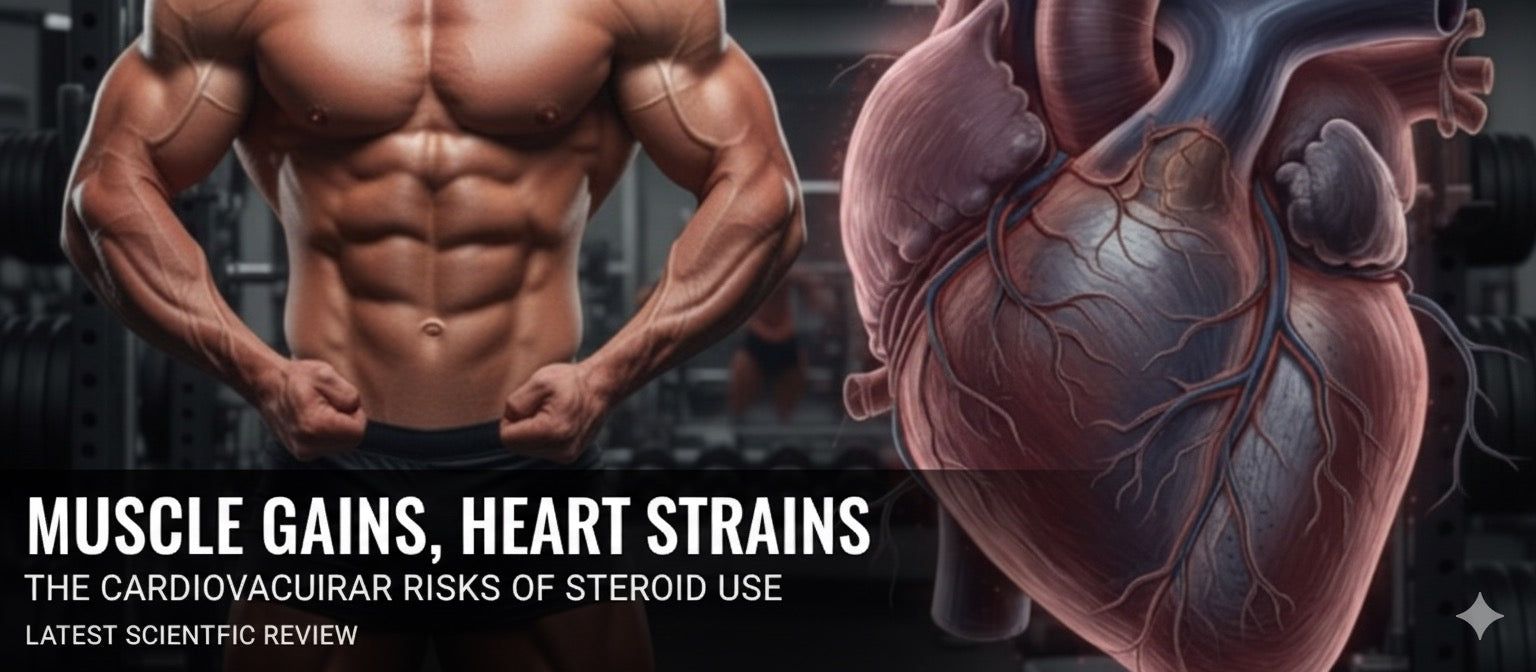

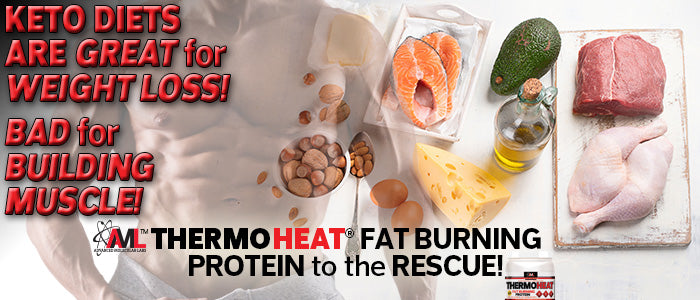
Protein Supplements for Weight Loss & Muscle Gain Tips
By Steve Blechman
Ketogenic diets have become a popular method for promoting keto weight loss, but are not useful for building muscle! Ketogenic diets lower the anabolic pathways: insulin, IGF-1, mTOR because of low protein intake. Ketogenic diets are great for weight loss/fat loss but can inhibit protein synthesis, muscle growth and lean body mass. AML™ THERMO HEAT® FAT BURNING PROTEIN is designed for people on low-carb, ketogenic diets. Research has shown that 6.25 grams of whey protein combined with 5 grams of pure leucine is four times more effective in increasing protein synthesis (equivalent to 25 grams of protein), which is ideal for people on ketogenic diets seeking protein supplements for muscle gain! Research has shown that pure leucine is more anabolic than leucine in food.
Leucine is the key amino acid for enhancing the mTOR pathway that regulates cell growth and protein synthesis. Leucine is an essential amino acid that serves as a building block for muscle protein synthesis. Leucine is a powerful anabolic trigger— it's the most potent branched-chain amino acid (BCAA) and a key activator of the mTOR pathway that is critical for muscle protein synthesis that promotes muscle growth. Testosterone acts through the mTOR pathway to promote muscle protein synthesis. Leucine has many benefits: powering muscle growth, preventing muscle loss, increasing insulin sensitivity, enhancing fat metabolism and enhancing recovery. It is considered one of the best supplements for muscle growth due to these benefits.
AML™ THERMO HEAT® FAT BURNING PROTEIN also contains vitamin D-3, which enhances the anabolic effects of leucine. Research has shown that leucine and vitamin D-3 can preserve muscle mass during dieting. A randomized controlled study showed that leucine and vitamin D combined with medium-chain-triglycerides (MCT) can increase muscle strength and function (J Nutr, 2016 May).
AML™ THERMO HEAT® FAT BURNING PROTEIN also contains 5 grams of citrulline. Citrulline can enhance muscle growth by stimulating the expression of IGF-1 and skeletal muscle peroxisome proliferator-activated receptor-gamma co-activator (PGC-1alpha), which increases mitochondrial biogenesis and lean muscle mass! PGC-1 alpha can also enhance fat burning, thermogenesis, brown fat activation and mitochondria uncoupling protein 1 (UCP1). Plus, prolong exercise time to exhaustion and improve exercise performance (Molecular Nutrition Food Research, June 2018).
A healthy weight loss is one that enhances the reduction of body fat and preserves lean body mass while dieting. Low-carbohydrate ketogenic diets provide about at least 70% of calories from fat, 20% from protein and 10% or less from carbohydrates. A ketogenic diet weight loss approach is more effective than low-calorie, mixed or high-carbohydrate diets for fast, short-term weight loss. The body produces ketones such as acetone, acetoacetate and beta-hydroxybutyrate during a ketogenic diet. The brain and nervous system use mainly glucose (blood sugar) as fuel and can also use ketone when carbs are unavailable. Incorporating protein supplements for weight loss into your keto diet can further enhance fat loss while maintaining muscle mass.
Diets stimulating ketones are high in fat, low in protein and carbohydrates. Ketogenic diets are low in protein and suppress protein synthesis by interfering with the mTOR pathway that regulates cell growth and protein synthesis. Ketogenic diets also have been shown to inhibit insulin-like-growth factor 1 (IGF-1). AML™ THERMO HEAT® FAT BURNING PROTEIN can increase protein synthesis, enhance muscle growth and lean body mass when following a ketogenic diet.
AML™ THERMO HEAT® FAT BURNING PROTEIN is very low in carbohydrates, protein and calories! It contains small amounts of high-quality whey protein isolate (supplying all the essential amino acids) of the highest biological value (no lower-quality hydrolyzed collagen protein is present), enriched with the amino acid L-leucine. Research has shown that vitamin D-3 is the most active form of vitamin D and can potentiate protein synthesis and the muscle-enhancing effects of leucine; and is added to help boost the anabolic and lean body mass effect of leucine. Also, recent research has shown that vitamin D supplements may enhance fat loss and improve waist-hip ratio and fasting blood glucose in vitamin D-deficient individuals. Leucine-enriched amino acid supplements can help preserve lean muscle mass during dieting. Like I said earlier, research has shown that taking 6.25g of whey protein with a high dose of leucine (5g) can enhance protein synthesis at the same rate as four times as much whey protein (25g)! Leucine is the key anabolic trigger of muscle protein synthesis. Increases in muscle protein synthesis are dependent on leucine concentration. 5 grams of leucine can increase the anabolic effects of protein synthesis by eating less protein, which is ideal on a ketogenic diet. Older adults (people over 40) show a blunted muscle protein synthesis (MPS) and anabolic resistance compared to younger adults. Recent research has suggested that the anabolic resistance can be overcome by consuming greater quantities of leucine. In a recent study, published in the Journal of Nutrition on July 1, 2018, it is confirmed that leucine and not total protein content of a "… supplement is the primary determinant of muscle protein anabolic responses in healthy older women." Lower-protein supplements with added leucine may represent an advantageous approach in older adults to maintain skeletal muscle anabolic sensitivity and attenuate muscle loss. Research has shown that leucine can enhance fat loss and promote weight loss during energy restriction. Leucine improves mitochondrial biogenesis and fatty acid oxidation and fat burning through SIRT-1 and AMPK-dependent pathways. AMPK (5 adenosine-monophosphate-activated protein kinase) regulates energy expenditure by modulating NAD metabolism and SIRT-1 activity. Leucine also increases glucagon-like peptide-1 (GLP-1), often referred to as the "satiety hormone."
A most recent study has found that taking pure leucine supplements alone (or with very small amounts of whey protein) may be better for muscle protein synthesis and more anabolic than food! In a randomized crossover study (Nutrients, October 18, 2018) 10 healthy, young Japanese men underwent tests under different conditions: consuming 2 grams of leucine alone; a mixed meal with 2.15 grams of leucine without any additional leucine supplementation; 2 grams of leucine right after a meal; and the final serving consisted of 2 grams of leucine, 180 minutes after a meal.
The study's conclusion was, "based on the aforementioned discussions, the intake of free leucine alone markedly increased the plasma leucine concentration. However, the increase in leucine concentration after the intake of a mixed meal containing the same amount of leucine was significantly less than that of free leucine intake alone. Moreover, when free leucine was ingested after a mixed meal with the purpose of increasing the plasma leucine concentration, the maximum plasma concentration was attenuated when it was ingested immediately after the mixed meal, despite the fact that the total leucine content was doubled. These results suggest that when free amino acids are ingested with the purpose of increasing plasma amino acid concentrations, the timing in relation to the mixed meal intake needs to be considered."
Increase in muscle protein synthesis is dependent on leucine concentration. Research has shown that leucine stimulates the anabolic effect of muscle protein synthesis on its own (Wilkinson et al., J Physiol 2013). When leucine is taken on an empty stomach (or with low amounts of whey protein), it has a powerful anabolic switch that turns on protein synthesis.
By taking pure leucine on an empty stomach (or with small amounts whey protein), you will get a better spike in blood levels than if you take leucine with food, because food can slow leucine's absorption. The addition of isoleucine and valine may hinder the benefits of leucine due to competition for transport into muscle cells. Leucine supplements increase mTOR activity for several hours after ingestion. Leucine is a solely ketogenic amino acid; it is not glucogenic! Isoleucine is ketogenic and glucogenic and valine is 100% glucogenic! Whey protein also contains other glucogenic amino acids that may not be desirable in those people following the ketogenic diet. By keeping the whey protein in the AML™ THERMO HEAT® FAT BURNING PROTEIN low, and boosting the leucine, this will keep isoleucine and valine low - which are both glucogenic amino acids, especially valine. This makes AML™ THERMO HEAT® FAT BURNING PROTEIN more ketogenic than 100% whey protein! When 5 grams of leucine is taken with small amounts of whey protein (6.25 grams), it can spike blood levels of leucine mTOR activation. The combination will also provide all the essential amino acids for protein synthesis, making it an excellent choice for those on a low carb diet plan.
AML™ THERMO HEAT® FAT BURNING PROTEIN, as I said earlier, contains 5 grams of citrulline per serving. Citrulline is a more effective supplement for increasing blood arginine levels and promoting intracellular nitric oxide. Citrulline supplementation may also facilitate the detoxification of ammonia via the urea cycle in the liver. As your body breaks down protein for energy during dieting, it produces ammonia, which can cause fatigue. Research has shown that reduced calorie and carbohydrate diets can increase blood ammonia levels especially when combined with high-intensity exercise. A most recent study in BMC Research Notes showed that 12 weeks of supplementation with 2 grams per day of citrulline lowered inflammation and inflammatory markers (c-reactive protein and tumor necrosis factor.) Increases in inflammation have been shown to be linked to obesity. Increased inflammation could also enhance muscle catabolism and muscle wasting. Citrulline, like I said earlier, can also enhance skeletal muscle peroxisome proliferator-activated receptor-gamma coactivator (PGC-1 alpha). PGC-1 alpha increases mitochondrial biogenesis, enhancing muscle growth. PGC-1 alpha can also increase insulin-like-growth factor-1 (IGF-1) upregulation. It also increases exercise adaption and enhancement of exercise capacity! PGC-1 alpha also increases fat oxidation, fat burning and thermogenesis. Citrulline also increases insulin sensitivity. Citrulline does not increase blood glucose, which is desirable for people on ketogenic diets. Research has shown that glucose production is suppressed in those who have greater increase in plasma citrulline concentration (Metabolism - Clinical and Experimental, November 2003). This makes it an excellent choice for those looking for a fat burn muscle gain supplement.
Potassium and magnesium citrate are added as important electrolytes and acid buffers (alkalinizers) when following low-carb and ketogenic diets. Low-grade chronic acidosis (which can increase muscle protein breakdown and bone loss), dehydration, electrolyte (mineral) loss and kidney stones are more prevalent in those people following a low-carb or ketogenic diets. Potassium citrate may help preserve lean body mass by reducing blood acidity in those following a low-carb, ketogenic diet. Also, recent research has shown that potassium citrate can help prevent kidney stones in those people following a low-carb or ketogenic diet! Also, a recent study presented March 16th and March 17, 2019 in New Orleans at the Annual American College of Cardiology 68th Annual Scientific Sessions showed that low-carb diets can raise the risk of heart rhythm disorders like atrial fibrillation, in susceptible individuals. The loss of potassium and depletion of other electrolytes such as magnesium has an enormous effect on the functioning of the heart. Low serum potassium and magnesium is associated with higher risk of atrial fibrillation.
AML™ THERMO HEAT® FAT BURNING PROTEIN does not contain pure ketone supplements such as beta-hydroxybutyrate (BHB). Ketone supplements in the form of BHB salts and ketone esters only provide a temporary increase in blood ketone levels. Ingesting exogenous ketones may briefly interrupt your body's natural production of ketones. BHB salts do not stimulate ketogenesis. Ketone supplementation reduces lipolysis and free fatty acids availability and may inhibit the body's natural ability to burn its own body fat for fuel. A most recent study has shown that feeding ketone BHB supplements in healthy humans may have an undesirable effect by activating the innate immune response and increasing inflammation. If you want to get the anti-catabolic and fat-loss effects of a ketogenic diet, ketone supplements are not desirable. Also, ketone supplements such as calcium BHB are high in calcium; people on ketogenic diets are at higher risk of kidney stones. High serum calcium levels can increase the risk of kidney stones in susceptible individuals. High calcium supplementation has also been linked to an increase risk of cardiovascular disease. Ketone supplements do not build muscle, lean body mass, or enhance weight loss, fat burning or cognitive function, according to the recent research (Applied Physiology, Nutrition and Metabolism, 2018; Frontiers in Physiology, 2017). Medium-chain triglycerides (MCT) naturally increase production of ketones in the liver and stimulate ketogenesis in humans. Research has shown that MCTs do not cause feedback inhibition or reduced ketone production. MCT stimulate the body's natural ketone generation.
AML™ THERMO HEAT® FAT BURNING PROTEIN is an advanced scientifically designed protein and amino acid drink based on the latest cutting-edge scientific research. As part of a low-carbohydrate, ketogenic diet and exercise program (aerobic and resistance training), it can help enhance protein synthesis and muscle growth and preserve lean body mass when following a low-calorie, low-carbohydrate, ketogenic diet. Remember, a healthy weight loss is one that enhances reduction of body fat, enhances muscle growth and preserves lean body mass while dieting. Losing muscle mass during dieting can decrease one's metabolic rate and result in burning fewer calories over a 24-hour period.
Bottom line: ketogenic diets are great for weight loss but bad and not useful for increasing muscle!
References:
1) Tyler A Churchward-Venne, Leigh Breen, Danielle M Di Donato, Amy J Hector, Cameron J Mitchell, Daniel R Moore, Trent Stellingwerff, Denis Breuille, Elizabeth A Offord, Steven K Baker, Stuart M Phillips, Leucine supplementation of a low-protein mixed macronutrient beverage enhances myofibrillar protein synthesis in young men: a double-blind, randomized trial, The American Journal of Clinical Nutrition, Volume 99, Issue 2, February 2014, Pages 276-286, https://doi.org/10.3945/ajcn.113.068775
2) Effects of a Vitamin D and Leucine-Enriched Whey Protein Nutritional Supplement on Measures of Sarcopenia in Older Adults, the PROVIDE Study: A Randomized, Double-Blind, Placebo-Controlled Trial. Bauer, Jürgen M. et al. Journal of the American Medical Directors Association , Volume 16 , Issue 9 , 740-747. September 2015
3) Devries MC, Philips SM, Baker SK et al. Leucine, Not Total Protein, Content of a Supplement Is the Primary Determinant of Muscle Protein Anabolic Responses in Healthy Older Women. The Journal of Nutrition, July 1, 2018.
4) Chunzi Liang, Benjamin J Curry, Patricia L Brown and Michael B. Zemel, "Leucine Modulates Mitochondrial Biogenesis and SIRT1-AMPK Signaling in C2C12 Myotubes," Journal of Nutrition and Metabolism, vol. 2014, Article ID 239750, 11 pages, 2014. https://doi.org/10.1155/2014/239750.
5) Binder E, Bermúdez-Silva FJ, André C, Elie M, Romero-Zerbo SY, et al. Leucine Supplementation Protects from Insulin Resistance by Regulating Adiposity Levels (2013). PLOS ONE 8(9): e74705. https://doi.org/10.1371/journal.pone.0074705
6) Effect of l-citrulline supplementation on blood pressure: a systematic review and meta-analysis of randomized controlled trials. Sepideh Mahboobi et al. Journal of Human Hypertension. Nature. Sep 11, 2018
7) Impact of 3-week citrulline supplementation on postprandial protein metabolism in malnourished older patients: The Ciproage randomized controlled trial. Bouillanne, Olivier et al. Clinical Nutrition, Volume 38, Issue 2, 564-574
8) Nitric oxide and mitochondrial biogenesis. Enzo Nisoli, Michele O. Carruba. J Cell Sci 2006 119: 2855-2862; doi: 10.1242/jcs.03062
9) Allerton, T.D.; Proctor, D.N.; Stephens, J.M.; Dugas, T.R.; Spielmann, G.; Irving, B.A. l-Citrulline Supplementation: Impact on Cardiometabolic Health. Nutrients 2018, 10, 921.
10) Sakiko Abe, Osamu Ezaki, Motohisa Suzuki, Medium-Chain Triglycerides in Combination with Leucine and Vitamin D Increase Muscle Strength and Function in Frail Elderly Adults in a Randomized Controlled Trial, The Journal of Nutrition, Volume 146, Issue 5, May 2016, Pages 1017-1026, https://doi.org/10.3945/jn.115.228965
11) Amely M Verreijen, Sjors Verlaan, Mariëlle F Engberink, Sophie Swinkels, Johan de Vogel-van den Bosch, Peter JM Weijs, A high whey protein-, leucine-, and vitamin D-enriched supplement preserves muscle mass during intentional weight loss in obese older adults: a double-blind randomized controlled trial, The American Journal of Clinical Nutrition, Volume 101, Issue 2, February 2015, Pages 279-286, https://doi.org/10.3945/ajcn.114.090290
12) Sampath, A., Kossoff, E. H., Furth, S. L., Pyzik, P. L., & Vining, E. P. G. (2007). Kidney Stones and the Ketogenic Diet: Risk Factors and Prevention. Journal of Child Neurology, 22(4), 375-378. https://doi.org/10.1177/0883073807301926
13) McNally MA, Pyzik PL, Rubenstein JE, Hamdy RF, Kossoff EH. Empiric use of potassium citrate reduces kidney-stone incidence with the ketogenic diet. Pediatrics. 2009;124(2):e300-4.
14) Dawson-Hughes B, Harris SS, Ceglia L. Alkaline diets favor lean tissue mass in older adults. Am J Clin Nutr. 2008;87(3):662-5.
15) Neudorf, H., Durrer, C. , Myette‐Cote, E., Makins, C., O'Malley, T. and Little, J. P. (2019), Oral Ketone Supplementation Acutely Increases Markers of NLRP3 Inflammasome Activation in Human Monocytes. Mol. Nutr. Food Res. Accepted Author Manuscript. doi:10.1002/mnfr.201801171
16) Yoshii et al. Nutrients 2018, October 18, 2018 (10), 1543; https://doi.org/10.3390/nu10101543Effect of Mixed Meal and Leucine Intake on Plasma Amino Acid Concentrations in Young Men.
17) A decrease in glucose production is associated with an increase in plasma citrulline response to oral arginine in normal volunteers. Apostol, Anthony T et al. Metabolism - Clinical and Experimental, November 2003, Volume 52 , Issue 11 , 1512-1516
18) Yoshitomi H, Momoo M, Ma X, et al. L-Citrulline increases hepatic sensitivity to insulin by reducing the phosphorylation of serine 1101 in insulin receptor substrate-1. BMC Complement Altern Med. 2015;15:188. Published 2015 Jun 18. doi:10.1186/s12906-015-0706-4
19) Inflammatory markers response to citrulline supplementation in patients with non-alcoholic fatty liver disease: a randomized, double blind, placebo-controlled, clinical trial. Zahra Darabi, Mina Darand, Zahra Yari, Mehdi Hedayati, Amirhosein Faghihi, Shahram Agah and Azita Hekmatdoost. BMC Research.2019/12:89 https://doi.org/10.1186/s13104-019-4130-6
20) Impact of 3-week citrulline supplementation on postprandial protein metabolism in malnourished older patients: The Ciproage randomized controlled trial
Bouillanne, Olivier et al. Clinical Nutrition, Volume 38 , Issue 2 , 564 - 574
21) Villareal MO, Matsukawa T, Isoda H. L-Citrulline Supplementation-Increased Skeletal Muscle PGC-1α Expression is Associated With Exercise Performance and Increased Skeletal Muscle Weight [published online ahead of print, 2018 Jun 25]. Mol Nutr Food Res. 2018;62(14):e1701043. doi:10.1002/mnfr.20170104
22) PGC-1alpha and mitochondrial metabolism - emerging concepts and relevance in aging and neurodegenerative disorders. Shane Austin, Julie St-Pierre.J Cell Sci 2012 125: 4963-4971; doi: 10.1242/jcs.113662
23) Stubbs, B. J., Cox, P. J., Evans, R. D., Santer, P., Miller, J. J., Faull, O. K., Clarke, K. (2017). On the Metabolism of Exogenous Ketones in Humans. Frontiers in Physiology. Retrieved from https://www.frontiersin.org/article/10.3389/fphys.2017.00848
24) Wilkinson DJ et al. Effects of leucine and its metabolite beta-hydroxy-beta-methylbutyrate on human skeletal muscle protein metabolism. J Physiol 2013,591,2911-2923.
25) Reid IR, Gamble GD, Bolland MJ. Circulating calcium concentrations, vascular disease and mortality: a systematic review. J Intern Med. 2016;279(6):524
26) O'Malley, T., Myette-Cote, E., Durrer, C., & Little, J. P. (2017). Nutritional ketone salts increase fat oxidation but impair high-intensity exercise performance in healthy adult males. Applied Physiology, Nutrition, and Metabolism = Physiologie Appliquee, Nutrition et Metabolisme, 42(10), 1031-1035. https://doi.org/10.1139/apnm-2016-0641
27) Cliff J. d C. Harvey, Grant M. Schofield, Micalla Williden, and Joseph A. McQuillan."The Effect of Medium Chain Triglycerides on Time to Nutritional Ketosis and Symptoms of Keto-Induction in Healthy Adults: A Randomised Controlled Clinical Trial," Journal of Nutrition and Metabolism, vol. 2018, Article ID 2630565, 9 pages, 2018. https://doi.org/10.1155/2018/2630565.
28) Wang L, Manson JE, Sesso HD. Calcium intake and risk of cardiovascular disease: a review of prospective studies and randomized clinical trials.
29) Waldman, H. S., Basham, S. A., Price, F. G., Smith, J. W., Chander, H., Knight, A. C., McAllister, M. J. (2018). Exogenous ketone salts do not improve cognitive responses after a high-intensity exercise protocol in healthy college-aged males. Applied Physiology, Nutrition, and Metabolism = Physiologie Appliquee, Nutrition et Metabolisme, 43(7), 711-717. https://doi.org/10.1139/apnm-2017-0724
30) Sara Y Oikawa, Chris McGlory, Lisa K D'Souza, Adrienne K Morgan, Nelson I Saddler, Steven K Baker, Gianni Parise, Stuart M Phillips. A randomized controlled trial of the impact of protein supplementation on leg lean mass and integrated muscle protein synthesis during inactivity and energy restriction in older persons, The American Journal of Clinical Nutrition, Volume 108, Issue 5, November 2018, Pages 1060-1068, https://doi.org/10.1093/ajcn/nqy193
31) Three-Day Magnesium Administration Prevents Atrial Fibrillation After Coronary Artery Bypass Grafting. Kohno, Hiroki et al. The Annals of Thoracic Surgery, Volume 79, Issue 1, 117-126, January, 2005.
32) Intravenous magnesium sulfate prophylaxis for atrial fibrillation after coronary artery bypass surgery. Kaplan, Mehmet et al. The Journal of Thoracic and Cardiovascular Surgery, Volume 125, Issue 2 , 344-352, February 2003.
33) Li H, Xu M, Lee J, He C and Xie Z. (2012). Leucine supplementation increases SIRT1 expression and prevents mitochondrial dysfunction and metabolic disorders in high-fat diet-induced obese mice. American Journal of Physiology - Endocrinology and Metabolism, 303(10), E1234-E1244. http://doi.org/10.1152/ajpendo.00198.2012
34) Tsuboi T, Maeda M, Hayashi T. Administration of L-arginine plus L-citrulline or L-citrulline alone successfully retarded endothelial senescence. PLoS One. 2018;13(2):e0192252. Published 2018 Feb 7. doi:10.1371/journal.pone.0192252
35) Audrey Chanet, Sjors Verlaan, Jérôme Salles, Christophe Giraudet, Véronique Patrac, Véronique Pidou, Corinne Pouyet, Nordine Hafnaoui, Adeline Blot, Noël Cano, Nicolas Farigon, Anke Bongers, Marion Jourdan, Yvette Luiking, Stéphane Walrand, Yves Boirie, Supplementing Breakfast with a Vitamin D and Leucine-Enriched Whey Protein Medical Nutrition Drink Enhances Postprandial Muscle Protein Synthesis and Muscle Mass in Healthy Older Men, The Journal of Nutrition, Volume 147, Issue 12, December 2017, Pages 2262-2271, https://doi.org/10.3945/jn.117.252510
36) Miriam E. Clegg (2010) Medium-chain triglycerides are advantageous in promoting weight loss although not beneficial to exercise performance, International Journal of Food Sciences and Nutrition, 61:7, 653-679, DOI: 10.3109/09637481003702114
37) A Low-Carbohydrate Ketogenic Diet Reduces Body Mass Without Compromising Performance in Powerlifting and Olympic Weightlifting Athletes. Greene, David A.; Varley, Benjamin J.; Hartwig, Timothy B.; Chapman, Phillip; Rigney, Michael. The Journal of Strength & Conditioning Research: December 2018 - Volume 32 - Issue 12 - p 3373-3382. doi: 10.1519/JSC.0000000000002904
38) Fat-Free Mass Changes During Ketogenic Diets and the Potential Role of Resistance Training.
Grant M. Tinsley and Darryn S. Willoughby. International Journal of Sport Nutrition and Exercise Metabolism 2016 26:1, 78-92
39) Vargas S, Romance R, Petro JL, et al. Efficacy of ketogenic diet on body composition during resistance training in trained men: a randomized controlled trial. J Int Soc Sports Nutr. 2018;15(1):31. Published 2018 Jul 9. doi:10.1186/s12970-018-0236-9
40) McKnight, J.R., Satterfield, M.C., Jobgen, W.S. et al. Amino Acids (2010) 39: 349. https://doi.org/10.1007/s00726-010-0598-z
41) Romero, M. J., Platt, D. H., Caldwell, R. B. and Caldwell, R. W. (2006), Therapeutic Use of Citrulline in Cardiovascular Disease. Cardiovascular Drug Reviews, 24: 275-290. doi:10.1111/j.1527-3466.2006.00275.x
42) Hayashi T, Juliet PA, Matsui-Hirai H, et al. l-Citrulline and l-arginine supplementation retards the progression of high-cholesterol-diet-induced atherosclerosis in rabbits. Proc Natl Acad Sci U S A. 2005;102(38):13681-13686. doi:10.1073/pnas.0506595102

